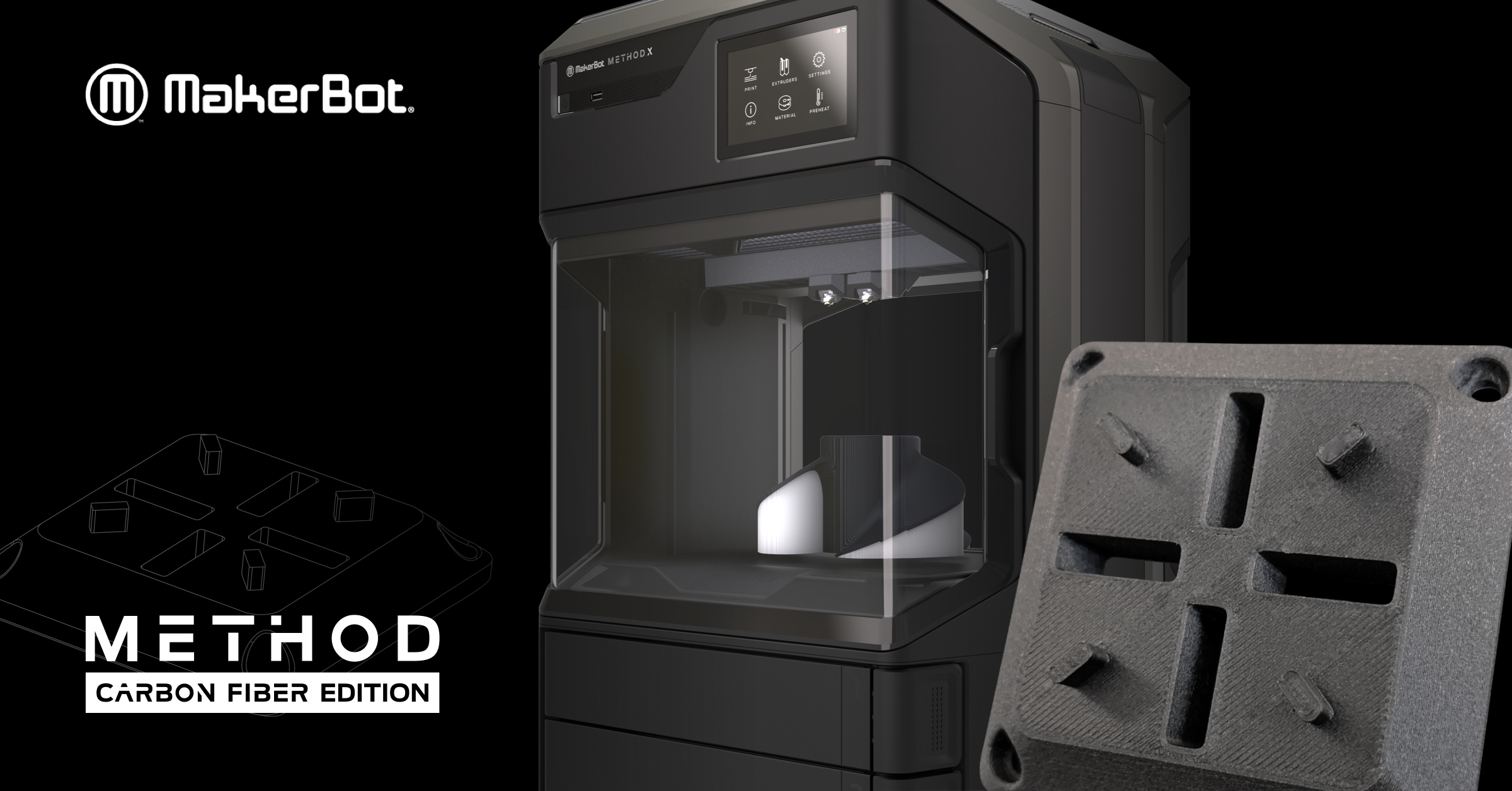Featured
MakerBot brings carbon fibre to 3D printing
New devices print carbon fiber reinforced nylon that is optimised for high strength and heat resistance.
Share
- Click to share on X (Opens in new window) X
- Click to share on Facebook (Opens in new window) Facebook
- Click to share on LinkedIn (Opens in new window) LinkedIn
- Click to email a link to a friend (Opens in new window) Email
- Click to share on Reddit (Opens in new window) Reddit
- Click to share on WhatsApp (Opens in new window) WhatsApp
- Click to share on Pinterest (Opens in new window) Pinterest
Stratasys subsidiary MakerBot, a global leader in 3D printing, has introduced a new level of 3D printing with the launch of Method Carbon Fiber Editions. The company says the new Editions are designed to enable engineers to print stronger and more accurate parts for manufacturing tools, jigs and fixtures, and end-use production. They can also be used to print metal replacement parts in some applications.
The latest additions to the Method platform, the Method Carbon Fiber Editions print carbon fiber reinforced nylon that is optimized for high strength and heat resistance. The new Method and Method X Carbon Fiber Editions come pre-configured with a new composite extruder that is optimized to handle abrasive materials. The new extruder, which is also available as an upgrade for the Method and Method X 3D printers, has hardened metal drive gears, a metal filament switch, and an interchangeable hardened steel nozzle. It can print MakerBot Nylon Carbon Fiber material and all other model materials supported on the Method platform.
The new MakerBot Nylon Carbon Fiber material is an ideal lightweight alternative to metal for structural applications such as vehicular brackets and inspection gauges, manufacturing tools such as robotic end effectors, and under-hood applications. Due to its strong thermal and mechanical properties, carbon fiber is frequently used in manufacturing, automotive, and aerospace industries. Used as an alternative to metal parts, carbon fiber can help reduce costs and increase overall efficiencies for companies.
“Nylon carbon fiber is one of the most in-demand and exciting classes of materials. Its high strength, heat resistance, and stiffness properties make it ideal for printing metal replacement parts, helping reduce costs and increase overall efficiency for companies,” says Nadav Goshen, President and CEO, MakerBot. “With the launch of Method Carbon Fiber, we are making composite 3D printing more accessible to more users than ever before and opening the door to new applications. Method Carbon Fiber is the latest addition to the rapidly growing Method 3D printing platform.”
The Method’s heated chamber produces strong manufacturing-grade nylon carbon fiber parts with superior surface finish. Users can print complex geometries with internal cavities using MakerBot’s PVA soluble support material and anneal the final part for extra strength with Method’s new heated chamber annealing feature. With the Method X Carbon Fiber Edition, users can print complex geometries using Stratasys SR-30 soluble supports for an even better surface finish. Breakaway supports are also available for faster print results. Method’s dry-sealed filament bays help to keep the moisture-sensitive nylon carbon fiber material dry, resulting in better print quality and reliability.
MakerBot plans to offer additional composite materials available for the Method Carbon Fiber Editions and the composite extruder for Method in the future. Since the Method X has a higher chamber temperature than Method of up to 110°C on the build plane, it will be able to support a wider range of high-performance composite materials in the future. The Method Carbon Fiber Editions, MakerBot Nylon Carbon Fiber material, and the composite extruder are expected to begin shipping in June 2020.
The Method platform features industrial 3D printing capabilities that make it ideal for printing with advanced, engineering-grade materials. The combination of a heated chamber, ultra-rigid steel frame, sealed material bays, performance extruders, and dissolvable supports enable engineers to print consistently accurate parts. Method offers a diverse portfolio of materials for a variety of engineering applications. MakerBot materials include Nylon Carbon Fiber, PC-ABS, PC-ABS FR, ABS, ASA, Nylon, PETG, Tough, PLA, and support materials SR-30 and PVA.
For more information, visit www.makerbot.com/carbon.
Share
- Click to share on X (Opens in new window) X
- Click to share on Facebook (Opens in new window) Facebook
- Click to share on LinkedIn (Opens in new window) LinkedIn
- Click to email a link to a friend (Opens in new window) Email
- Click to share on Reddit (Opens in new window) Reddit
- Click to share on WhatsApp (Opens in new window) WhatsApp
- Click to share on Pinterest (Opens in new window) Pinterest
| Thank you for Signing Up |


















